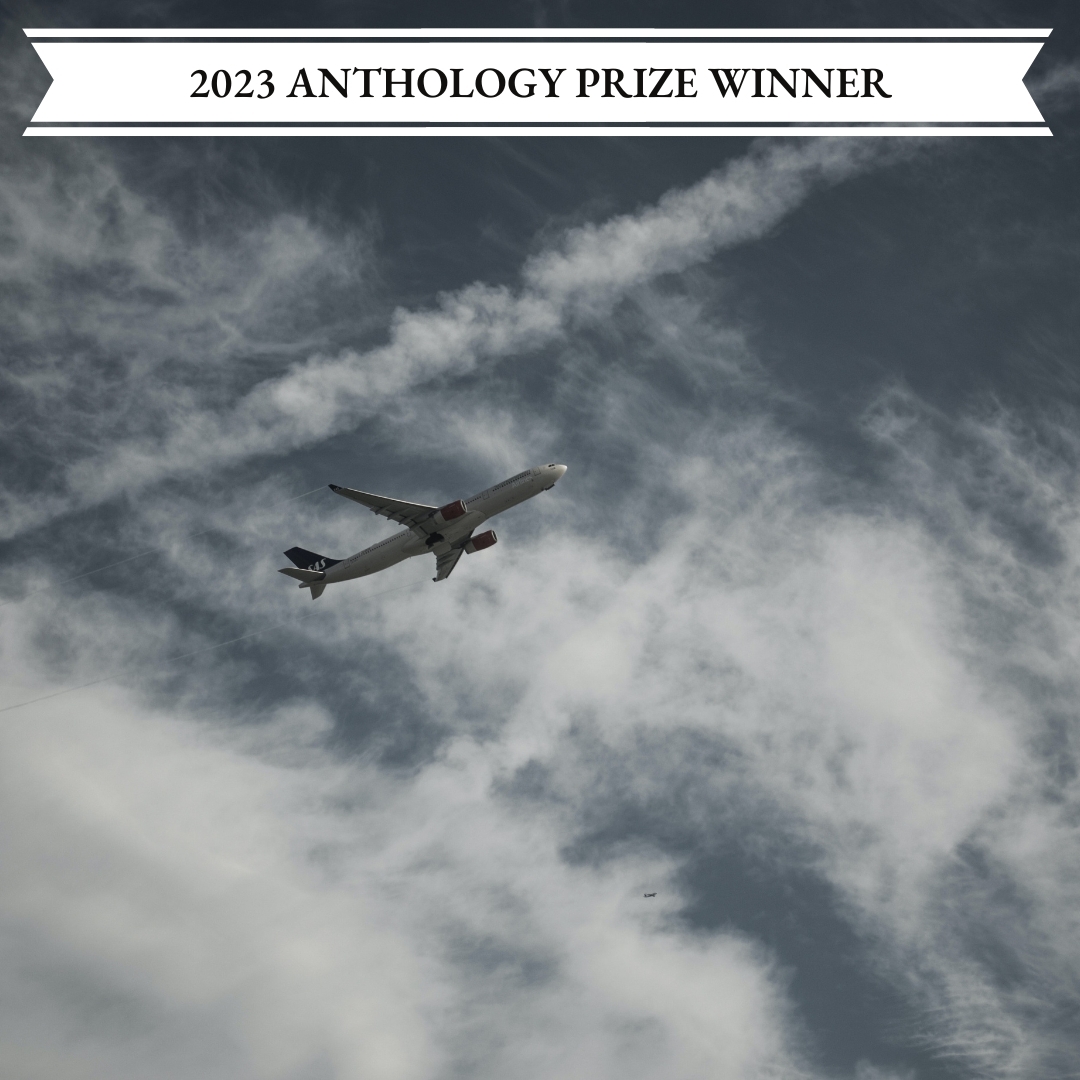It is not an air raid. Above the city’s steepled church-tops the two planes break from the clouds. Sunlit rain begins to trickle down, and then the smell from wet city streets. The clock tower strikes a warning.
“Judita, you had best head home before they begin,” says the young man selling apricots. He is much younger than her, and she wonders—if she’d been a younger mother— if her eldest would now look something like him.
“Why would I tire myself out hurrying already?” says Judita.
The shoppers point at the coming airplanes, but after all this time, they no longer duck underneath the store’s racks or brace themselves in one of the old plaza’s archways.
There’s that odd murmuring, of the townspeople, of—which will win this time?
Judita doesn’t hide because nobody else is hiding. Of course, they won’t fire at any of the people on the ground. Already the pilots above are likely saluting one another and grinning at their chance to take another round.
Up there, the airplanes shine like coins, wings tipped at angles into the wet sunlight. Engines and propellers chatter. Davit, if he were here, would tell her the engines’ names with some pride, machines named after some bird of prey. When the red plane finds its way out from the sunlight, she sees faintly the many-colored patterning along its oval wings and knows that it is the machine named Pierrougia.
Pierrougia tips a wing at the approaching pilot; a salute. Then it is the opening of both planes’ Vickers guns, the rolling of the shapes in their joust with engines bickering on, then both are away back into the clouds, untouched.
Davit said once, lying on the grass and tearing at a dandelion, that the new airplanes can dodge rain-drops if they so choose. But Pierrougia and the other machines are old and must take the warm water and contend with rusting and their pilots’ slipping on the wing when it is time to dismount.
Up in their apartment, Judita finds her father and her daughter.
Simon is there in the kitchen with the girl balanced on his side, his granddaughter fallen asleep on an old shoulder. The barely-damp breeze pulls at a hanging shirt and carries with it that same lasting smell of fallen rain, and the man shifts slightly to the warm sound of a folk dance on the living room radio.
It is as though Simon is a new father himself: no longer Judita’s but a doting man, smiling with the sleeping girl, reborn in this way. Judita finds a large wicker basket at the foot of a cupboard, and begins corralling items, quickly.
“Still in some hurry?” Simon whispers.
“How was it today?” Judita says, and her father just looks down at the sleeping girl and raises his eyebrows, nodding.
Judita looks at her daughter. Why does she somehow feel like a grandmother and not a mother—and how many grey hairs will her girl find when she begins to truly see? Will it be the handful, now, or the head of a withered mother who cannot run with her and speaks with the voice of Judita’s own mother?
Judita ducks low to reach out and close the window, and there are the planes again up high: Pierrougia’s red hull is blazing with stars and in a wheeling whirlwind, passes. The foe’s guns begin to roar again.
Pierrougia weaves through it all and finds its way to double back, opening fire, and there is that sharp clang of some stray bullet striking the adversary’s hull. Both planes vanish again, behind the clocktower. Rain, again, briefly falls. Judita smells petrol. Her daughter sleeps through it all, nestled into her grandfather’s shoulder as he sways.
Judita is in the rocky field not far from the city, the sun shining through the clouds. The scattered boulders are damp: pebbles, gleaming. She opens her basket and unfurls the blanket atop smooth grass.
Judita arranges the pieces of food, pouring an extra glass of wine at the picnic-site. If she sets it all up like this, with everything in order, then he will know just where to land.
The machines do return: Pierrougia, at tilt. Turning and turning, rising like a merlin in a high thermal. The sound of engines is the only thing; then guns that fire again, from both sides, and the adversary is totaled with the flames bursting across its metal span as it twists away down into the wooded marshland. Pierrougia tips a wing in salute again.
But the red, starry airplane has taken it, too, and then Judita’s stomach has a slight turn as always as she sees the plane wilting from the sky and trailing black smoke.
Pierrougia comes down hard, scraping to a stop at the rocky edge of the field, the pilot clambering from the airplane as flames begin to bloom at its propellor, him popping up the cockpit’s glass and sliding down the wet wing. The pilot, leather-capped, throws his shattered goggles into the wreckage.
Pierrougia burns again. The pilot wanders towards Judita’s picnic, stretching his arms and stuffing gloves into his pockets. Steam rises from the metal of his harness that he just then begins to notice, and he unfastens his belt, the heavy pieces falling away to hiss in the spring grass.
He sits, and she hands him wine, saying, “Are you all right this time?”
His eyes are great and cloud-filled, ringed by the bruises of heavy goggles.
“Well enough, he says.” They drink.
“You nearly woke her up this time, fighting so close to the city,” Judita says. “You could fight somewhere else next time.”
Davit is famished and digs into the plate of bread and cheese, thumbing the pit from an apricot. He looks older, there, but Judita must remind herself that he has gotten older since they were married.
“If we fought up in the mountains or down across the marshland,” Davit says, “who would see us?”

